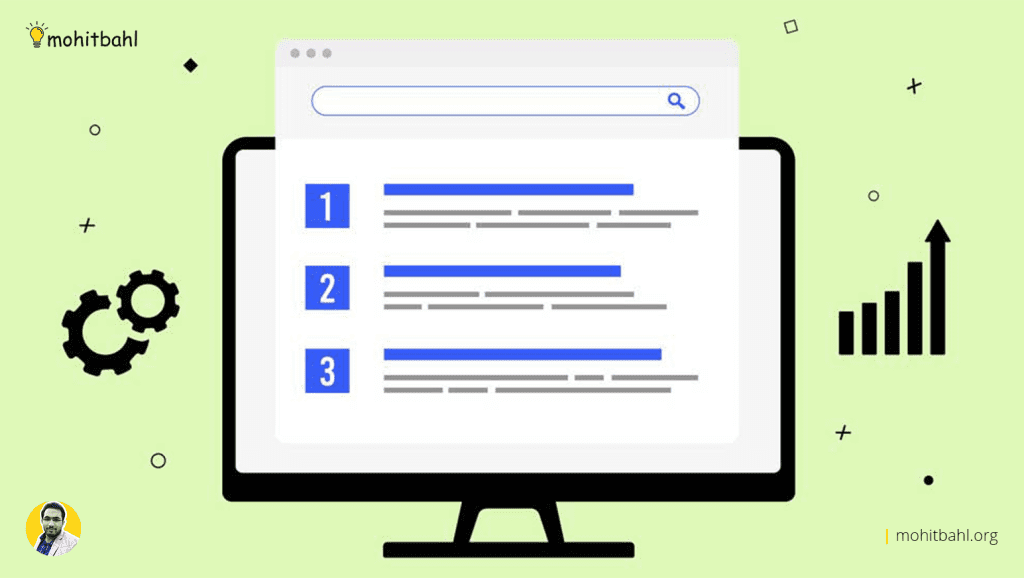SERP stands for Search Engine Results Page. It refers to the page displayed by a search engine, such as Google or Bing, in response to a user’s search query.
The SERP typically displays a list of web pages or other types of content that are deemed relevant to the user’s search query, along with other features such as ads, featured snippets, knowledge graphs, and more.
The order in which the results are displayed on the SERP is determined by the search engine’s algorithm, which takes into account various factors such as the content of the web pages, their relevance to the user’s query, and their authority and popularity on the web.
What does SERP mean in SEO?


A typical SERP includes several different types of content, including organic search results, paid search ads, local search results, knowledge graphs, featured snippets, videos, images, and more.
The exact layout and content of the SERP depends upon the search engine, the searched query, and other few factors.
The organic search results are the central part of the SERP and are the web pages that the search engine considers to be the most relevant and valuable for the user’s query.
These results are ranked in order of relevance based on several factors such as the content of the page, the quality of the website, and the significance of the page to the user’s search query.
Paid search ads, also known as sponsored results, are typically displayed at the top three or bottom of the SERP and are identified as ads.
These ads are created by advertisers who bid on keywords related to their products or services, and they pay the search engine a fee each time a user clicks on their ad.
Local search results are displayed for queries that have local intent, such as best institute near me or Digital Marketing Services in Texas. These results are typically shown on a map and include information about the business’s location, hours, reviews, and other details.


Featured snippets are results that appear at the top of the organic search results and provide a brief answer to the user’s query. These snippets are generated automatically by the search engine and are designed to provide users with quick and helpful answers to their questions.
How to Optimize for SERP?
Optimizing for SERP involves a range of techniques and strategies that can help improve the visibility and ranking of your website on the search engine results pages.
Here are some tips to help you optimize your website for SERP.
- Conduct keyword research: Conducting keyword research is an essential step in optimizing your website for SERP. Identify the keywords and phrases that your target audience is searching for and optimize your content around those keywords.
- Create high-quality content: Your content should be informative and relevant to the user’s search query. Use headings, bullet points, and other formatting techniques to make your content easy to read and understand.
- Optimize your meta tags: Your website’s title tag and meta description should include your target keywords and accurately describe the page’s content. This will help the search engine, and users understand what your page is about.
- Use structured data: Structured data, also known as schema markup, helps search engines understand the content and context of your website. This can help improve your website’s visibility and ranking on the SERP.
- Build high-quality backlinks: Backlinks from other high-quality websites can help improve your website’s authority and ranking on the SERP. Focus on building natural, high-quality backlinks from relevant websites.
- Optimize for local search: If your business has a physical location, optimizing for local search is important. This includes adding your business to local directories and optimizing your website for local keywords and phrases.
- Use social media: Social media can help drive traffic to your website and improve your website’s visibility on the SERP. Share your content on social media platforms and engage with your audience to build your online presence.
These are just a few strategies for optimizing your website for SERP. Remember that SEO is a long-term and, more importantly, ongoing process that can take time to show results.
Focus on creating high-quality content and building a strong online presence to improve your website’s ranking and visibility on the search engine results pages.
Overall, the SERP is a crucial element of the search engine experience, as it provides users with a variety of content and information to help them find what they are looking for.
For website owners and marketers, understanding how the SERP works and how to optimize for it is an important part of search engine optimization (SEO) and online marketing.
Do let me know your feedback about my article in the comments below!


